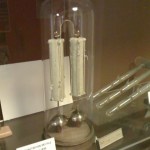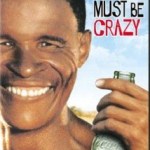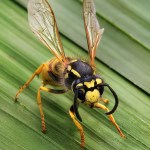General
Credit: Wikimedia Commons
A whimsical thing: the Oxford Electric Bell, pictured here, is a battery-powered device that has been running (almost!) continuously since it was built in 1840. A clapper on a pendulum rocks from side to side between two metal spheres, driven by electrostatic forces. The bell is powered by a pair of mysterious batteries, the composition of which is unknown.
However, because it sits behind two layers of protective glass, the bell is inaudible.
During the First World War, an enterprising British field medic named Sgt James Shearer unveiled a machine that promised to revolutionise medicine. Shearer’s “Delineator” was a small wooden box that had an aperture at one end and a crank on the side. Clicking the shutter and winding the arm produced a small drawing of a human figure, punched with holes that diagnosed disease in any patient sat in front of it. The British Medical Journal hailed it as a life-saving device. These were the years immediately after Wilhelm Röntgen’s discovery of x rays, and the world was abuzz with the idea of…
Researchers at the Institute for Ophthalmic Research at the University of Tübingen have restored vision in blind patients using tiny retinal implants embedded in the eye.
Nine patients were chosen because they had all suffered hereditary diseases where the retina had degenerated to the point of blindness, but left the remainder of the visual pathway intact. Eight of the nine could still detect some light, although could not locate its source. One was completely blind. Each was implanted with a tiny 3x3mm film square containing 1,500 photodiodes which send out electrical…
Recently, I noticed something strange about the postage stamps on my mail. They have a glossy coat that can only be seen at certain angles. Written in this glossy ink are the words ROYAL MAIL over and over again, like a watermark. But there's something wrong. Can you spot it?
Look at the second line from the top - there seems to be a typo! On the left, it says M12L instead of MAIL. On the right, it says MTIL instead of MAIL. Here's the same image, in high contrast.
I hunted around for another second class stamp to see if the pattern repeated itself. Instead, I found this.
…
Pretty wild news this morning - a meteor shower over the Central Russian cities of Yekaterinburg and Chelyabinsk has caused hundreds of injuries and damaged buildings. It is not connected with tonight's (very!) near-pass of asteroid 2012 DA14. Thanks to the prevalence of dashboard cams in Russia, there's some amazing footage already circulating.
The web's resident expert on all things heavenly, Phil Plait, has the details and analysis.
"The problem with the London sci-comm crowd," a friend once smiled to me, "is that they can't invite their mates to the pub without giving it a title and calling it outreach". That jest has been on my mind lately, as many among us fret over the future of the UK's oldest science outreach organisation, the Royal Institution, after a botched attempt to modernise its stately London headquarters left those same hallowed grounds under threat of sale. Inevitably, these conversations have led people to question what it is the Royal Institution does, and whether this qualifies a proposed multi-million…
I first saw this video at Planet 3.0 a fair while ago and have seen it posted again since. I find it very uplifting despite being a jaded climate blogger of many years. There are many other science-based music videos at www.symphonyofscience.com and I have listened/watch most (all?) of them, but this is the best as well as being on topic here.
I think it is just about the perfect mix of the various elements of outreach needed to motivate the general public: explanation, urgency and optimism.
I finally got around to playing the Walking Dead videogame this weekend, and I'm already hooked. "Video game" is a bit of a misnomer really, as it's more a piece of interactive fiction. You must guide your character, Lee Everett, through the dangers and dilemmas of a rapidly disintegrating society where the dead are returning to life. The decisions you make will have repercussions, both for your own character and the others you meet, and often you'll be forced to make choices that are not simple good versus bad, but bad versus bad. I've only played it for a couple of hours, and…
I quite like these spurious yet serious Haynes manuals!
From the press blurb:
British science writer and broadcaster Professor Chris Riley has written a book on the story of the Apollo Lunar Rover to coincide with the 40th anniversary of the vehicle’s final drive on the Moon, in December 1972.
Commissioned even before the first human beings had walked on the Moon, and intended to carry future explorers further and faster, through the mountainous lunar highlands, the ‘LRVs’, as they were called, symbolized NASA’s commitment to human space exploration, and a future of people living and working…
The science and technology blogs were alight with adulation last week with the news that with no assistance, illiterate Ethiopian children had learned to use and even "hack" computers given to them. Speaking at MIT Technology Review’s EmTech conference, the founder of the One Laptop Per Child initiative revealed an experiment in which Motorola Xoom tablets had been given to young children in two remote villages to see what they would do with them, and found that within months the children had learned to access a variety of pre-loaded material and even change the locked settings.…
Dressed in a leather jacket and black roll neck, Daniel Libeskind holds an air of affability that complements his passionate and lucid discussion about the importance of architecture in healing and rebuilding communities. Born into a Jewish family in Poland, he experienced life under the totalitarian Soviets before emigrating to New York, a narrative that makes him ideally suited to be the man who produced new visions for Germany and Poland after the fall of the Berlin wall through to the Freedom Tower which rose from the shadows of the World Trade Centre in New York City.…
Aaron Kaplan is rather in awe of being invited to the Falling Walls conference for what he calls his “hobby project”. But not all of us can boast a hobby that connects hundreds of thousands of people to the internet in a democratic, decentralised fashion. He is the founder of Funk Feuer, a peer-to-peer mesh that creates a cheap, robust, and distributed communications network.
Long before Senator Ted Stevens achieved meme fame with his description of the internet as a “series of tubes”, Bertolt Brecht opined that radio was used purely for distribution, and envisioned that if it…
Perhaps having anticipated some bleary eyes in the audience following last night’s reception cocktails, Google’s chief economist Hal Varian starts his Falling Walls lecture with a question: what day of the week are the most Google searches for “hangover”? The answer is, unsurprisingly, Sunday, a fact revealed by Google’s Trends platform, an open data project that allows anyone to delve into the wealth of knowledge in Google’s search records. Hangover follows a regular, predictable pattern according across the week, shown blue:
That red…
Chinese Necklace by Inextremiss (Flickr)
From the Annals of the Weird, or more precisely Proceedings in Obstetrics and Gynecology, comes the story of a 21-year-old woman from rural India presenting a benign vulvar tumour resembling a "soft, pedunculated mass, with a wrinkled surface dangling from her left labia majus" about the size of a tennis ball. She had been abandoned by her husband, proving he was insecure about the fact his wife had bigger balls than him. Happily, after a visit to the doctors, the five year old growth was removed with "excellent…
From London's Pathology Museum at St Bart's Hospital: the Eat Your Heart Out Pop-Up Cake Shop, where the foul fondants and fancies reflect various medical conditions and other disease detritus. Below: varicose vein cupcakes.
So this is an idea shamelessly stolen from Noah Smith, a blogger who writes about economics. He has created an "illustrated bestiary", introduced thusly:
In your journey through the Econ Blogosphere, you will be beset by a great many curious and interesting species of EconoTroll. At first you may be intimidated by their voluminous use of insider jargon, their rough-and-tumble personal attacks, their strenuous insistence that you read the complete works of their movements' founders before participating in any discussion, and above all their sheer persistence and apparent surplus of spare…
William Seabrook achieved fame in the early 20th century as a man willing to travel the world in search of adventure (and drink), eating with cannibals in West Africa and uncovering the Haitian zombie. His fascination with the occult and witchcraft guided many of his travels, and he was guest of honour at a remote cabin in the Maryland woods in January 1941, where a group of right-on youths were attempting to put a hex on Hitler. Life magazine has the details of the hexing party, reporting that having "bedeviled themselves with rum", the group dressed a dummy as the…
I thought this was a really interesting piece, and a very important one to anyone interested in public healthcare. The original source appears to be a Moscow paramedic writing under a pseudonym. Apologies for the machine translation, but you get the main points.
--
The secret side of medicine or why doctors are silent?
In recent years, in private conversations, I often ask: Why are silent your colleagues? It would seem, who does not like doctors to sound the alarm about the real state of affairs in medicine. Why are they silent? Try to understand.
It is such a red…
So I've peeled my calendar off the wall where the persistent, driving rain has seeped into the brickwork and glued it into place, and what do you know, summer's over! And thankfully, all that rain drove away the wasps. Do you realise how fortunate you are? Yeah, I'm talking about these little buzzing slivers of nightmare dust.
Pure evil.
They build nests out of paper vomit, invade picnics, sting you. Not many people like wasps. Normally I'd be the first to defend these creatures, with their marvellous evolutionary adaptations to extraordinary ecological niches…













